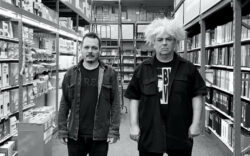With a disarming geniality and intellect, Angel Olsen excels in the art of conversation. She’s genuinely engaged when talking about her artistic intentions—or the lack thereof—when she started writing the songs that ultimately came together on her fourth and most acclaimed album, My Woman.
“I’ve never really known, conceptually, where my writing is going to go when I’m working on a record,” Olsen says. “I just think I’ve grown as a person, and my perspective has changed as far as how I should use my voice. I wanted to approach a different mode from what I used on previous records.”
My Woman was released in September via Bloomington, IN’s Jagjaguwar Records. The bold and moody atmosphere of songs such as “Woman” and “Sister,” juxtaposed with the yearning in “Never Be Mine” and “Shut Up Kiss Me,” paints a portrait of a character who’s searching to find balance between ideology and life’s daily struggles. In “Woman,” Olsen argues with herself, or perhaps someone else who thinks she deserves lesser treatment: “You can leave now if you want to, I’ll still be around/ This parade is almost over, and I’m still your clown.”
Since her solo debut with the Strange Cacti cassette in 2010, Olsen has been unwittingly hoisted as a burgeoning young icon of feminism in indie rock. With her songwriting career now taking off amid the sociopolitical climate of the strangest and most heated election season in recent history, her presence on the music landscape has come under the microscope.
While it’s true that Olsen’s writing embraces the tenets of feminism, there are complex layers to her mind and persona. From her days spent singing backup on the road with Bonnie “Prince” Billy circa 2012 to her recent anti-Trump anthem “Fly on Your Wall”—for the Our First 100 Days subscription compilation—Olsen has never fallen in line with anyone’s expectations. She switches gears at will, writing songs on synthesizer one moment and picking up a guitar the next. Her work vacillates between the playful—see her on roller skates in the “Shut Up Kiss Me” video—to the bold and brokenhearted (“Never Be Mine”).
When it comes to context, a press release preceding My Woman’s arrival featured a telling declaration from Olsen: “I’m not trying to make a feminist statement with every single record just because I’m a woman. But I do feel like there are some themes that relate to that, without it being the complete picture.”
Delving into the complete picture reveals insight into the impressive amount of growth Olsen has undergone since releasing 2014’s Burn Your Fire for No Witness.
“In some ways, I’ve been really [descriptive] about certain things with past albums,” Olsen says. “With My Woman, I’m still being [descriptive]. But rather than say something directly—saying what the problem is—I feel more like I’m setting up an argument.”
Throughout My Woman, Olsen touches on intensely personal relationships in her life. “Like my relationship with my father, or with the men in my life—most of whom are good people, but don’t realize they’re treating someone a certain way,” she says. “I’m setting up an example, rather than saying, ‘You’re terrible, and men are awful.’ Obviously, that’s not my goal,” she says with a laugh. “But as a woman, it’s hard not to address these things.”
The elevation in style bears the mark of both experience and age for Olsen, who turned 30 on Jan. 22. Within the first few moments of My Woman’s opening number, “Intern,” the hushed tones with which she sings illustrate her push to use her voice in a variety of new ways. By comparison, older singles, such as “Windows” and “Hi-Five” from Burn Your Fire for No Witness, feel timid when played next to newer songs like “Shut Up Kiss Me.”
Olsen also attributes the growth to settling in with a regular cast of musicians. For her current round of touring, she is joined on stage by guitarists Paul Sukeena and Luke Norton, bass player Emily Elhaj, drummer Josh Jaeger and backing vocalist Heather McEntire.
For Burn Your Fire for No Witness, Olsen teamed up with producer and engineer John Congleton, whose work on St. Vincent’s 2014 self-titled release earned a Grammy for Best Alternative Album. Each song was recorded live, adding to the immediacy of the album. It also meant there was not much that could be done during post-production. “There are some mistakes in there that we just had to go with,” Olsen says. “We had to figure out how to make it work.”
This time, Olsen was ready for something sonically different. My Woman was recorded at Vox Studios in Los Angeles in early 2016 with producer Justin Raisen and engineer Michael Harris.
The resulting album isn’t quite as dark, and it embraces a more modern palette of sound and vocal textures. “What I’m trying to do is learn how to use effects differently,” Olsen says. “On the last record, [the production is] super dry… The new songs sound more interesting to me because of the sounds.
“I feel older,” she adds. “When I read the writing on this record, it makes sense to me.”
Like what you just read? Support Flagpole by making a donation today. Every dollar you give helps fund our ongoing mission to provide Athens with quality, independent journalism.










